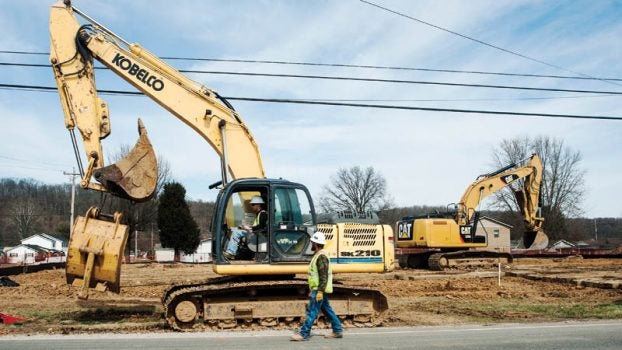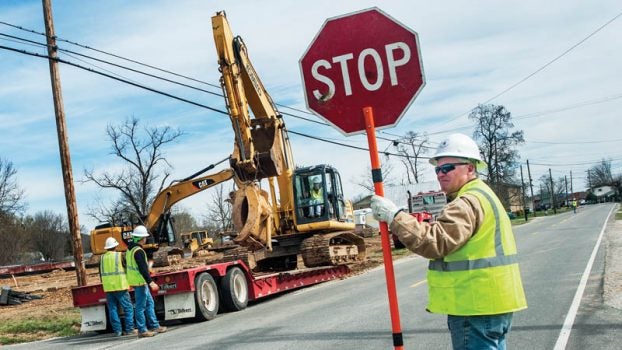Work begins on Burlington area pipeline segment
Published 11:48 am Thursday, March 16, 2017
Project approved in January, part of larger system running from Pennsylvania
BURLINGTON — People in the Burlington area are seeing the first phases of construction on a new segment of a natural gas pipeline that will reach go under the Ohio to Wayne County, West Virginia.
Work on the BM-111 Loop, a proposed loop of Columbia Gas Transmission’s R-System pipelines, began in February, Scott Castleman, manager of natural gas communication for TransCanada, which has acquired the project, said.
“TransCanada acquired Columbia Pipeline Group on July 1, 2016,” he said, noting that the operating company in the region is still named Columbia Gas and is the entity that filed for project approval with Federal Energy Regulatory Commission.
The three-mile segment of 36-inch diameter pipe, will extend from Columbia’s existing Burlington meter station.
Castleman said, to install the pipe, the company will employ horizontal directional drilling (HDD) to go under the riverbed.
“It won’t impact the river or affect river traffic,” he said of the construction.
Castleman said the drilling is a trenchless method to install underground pipelines underneath water bodies, roads, railways, buildings and other structures. He said the process is used to cross sensitive areas and reduce the impact of a project.
“We drill horizontally under the river, so we don’t impact the river,” he said. “There are three phases of construction associated with HDD, which are pilot hole creation; pre-reaming and pullback. At the completion of the HDD, a full demobilization and restoration effort takes place.”
Castleman said additional launcher and receiver facilities will be installed to allow the line to be periodically cleaned and inspected.
“This allows us to put different tools in for cleaning, inspections and to check for dents,” he said.
One of the facilities will be installed at the Burlington meter station, while the other is planned for the Ceredo compressor station on the West Virginia side.
“In all, these upgrades will add to the capacity of the R-System, while also making it more safe and reliable,” Castleman said.
Castleman said construction on the BM-111 Loop will employ about 140 people, the majority of which will be local union employees.
The starting point of the horizontal drilling will be across the street from the Burlington facility, he said, which will require crews to bore under County Road 1. He said the project is not expected to cause traffic tie-ups on the roadway.
TransCanada, based in Calgary, Alberta, operates a pipeline network, including 31,000 miles of natural gas pipeline in the U.S., throughout North America and is owner of the Keystone Pipeline, an oil system of which the planned fourth phase, Keystone XL, was rejected by the administration of Barack Obama, but has been permitted by Donald Trump, who took office on Jan. 20.
The BM-111 Loop is part of the larger Leach Xpress Project, which will move natural gas south from Pennsylvania to West Virginia. The project’s route in southern Ohio will run south of a newly-built compressor station in Oak Hill, Jackson County, through the Wayne National Forest to the Burlington site. The project will be constructed using 50-foot easements, in which the land is cleared of trees. After pipeline is laid, the land is restored, Castleman said, but kept clear of trees for maintenance.
He said Leech Xpress will use a combination of new and existing easements and will serve local customers, as well as long distance needs.
“With the greater need we’ve seen in the region with Marcellus Shale and Utica Shale, that gas needs to move to market,” Castleman said.
Castleman said the larger project will provide “thousands” of jobs and said construction on both Leach Xpress and BM-111 Loop will be completed by fall.
Natalie Thompson, director of the Ohio Valley Environmental Coalition, based in Huntington, said her organization has been tracking developments with new pipelines.
“We’ve been active on multiple pipelines,” she said. “We are trying to gather information and educate people.”
Thompson said the group has also been focused on the Mountaineer Xpress pipeline on the West Virginia side of the border.
She said a good deal of the group’s effort has been spent trying to keep up-to-date with changing pipeline paths and they are concerned with an impact on public health.
“We’re concerned about air pollution, water pollution, waste disposal and disruption of ecosystems,” Thompson said.
“These pipelines are getting bigger and bigger,” Thompson said, noting that lines as large as 48-inches have been proposed in places in Virginia and West Virginia.
Robin Blakeman, a project coordinator for OVEC, said the BM-111 path from Burlington to Ceredo is a focus of the group’s efforts.
“We have pretty big concerns about that, especially in its passage under the Ohio River,” she said. “With it being a waterway and possible ruptures and potential leaks. It’s supposed to come up (in West Virginia) around Camden Park. And the Ceredo compressor station is going to be three times larger. We have our work cut out educating people in the Tri-State and making sure they continue to be aware.”
Blakeman said the group did not take part in the public comment on the Leech Xpress in 2015.
“It kind of snuck up on us,” she said, adding that the group has several informational meetings planned on pipeline projects, one of which was set for Wednesday night. Further meetings will be announced on the group’s website, she said.
Leach Xpress was initially planned by Columbia Gas. The project, now under TransCanada, was approved by the Federal Energy Regulatory Commission on Jan. 19, 2017 and work began in February.
Castleman said Columbia Gas and TransCanada are working to address community concerns.
He said the new pipeline would use state-of-the-art-technology and the company would maintain aerial patrols, foot patrols and would monitor pressure 365 days a year.
He said the company has worked to modernize its infrastructure following a December 2012 pipeline explosion in Sissonville, West Virginia which leveled several homes and made regional headlines.
“Any incident is inexcusable,” Castleman said, stating the new line is meant to last generations. “We’re making sure the pipeline is safe and reliable.”
He said the company has spent over $1 billion since the Sissonville incident to upgrade its pipeline and plans to spend $1 billion more.
Castleman said as Columbia Gas is based in Charleston, West Virginia, the company employs workers throughout the region.
“We have operated in Ohio and West Virginia for close to 100 years,” he said. “We are committed to being a good neighbor during construction, and through operation, of this project. We’re not outsiders coming in and laying pipe. We want to do everything we can to operate a safe system.”
Castleman said landowners can direct questions or concerns to Columbia Gas at 1- 888-499-3450.







